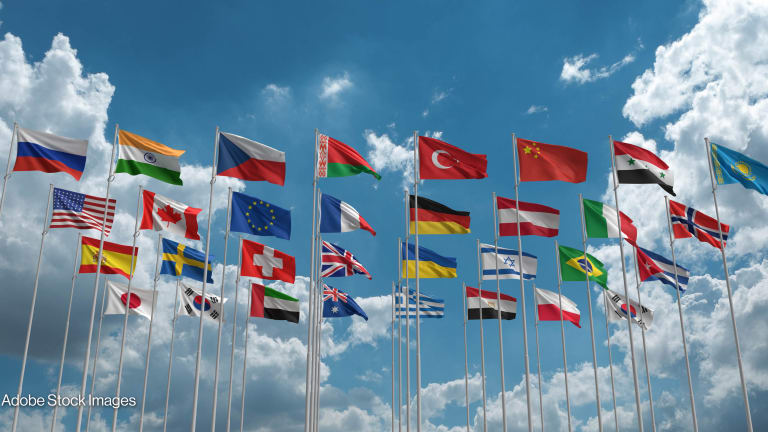
Central banks tend not to be seen as innovative climate change pioneers, but as extreme weather events continue to undermine economic stability, real change is afoot.
In the global south — where populations tend to be the most exposed and least equipped to cope with the ongoing climate emergency — financial powerhouses are shrugging off their conservative image and promoting new developments in sustainable and green finance.
Many are members of the Alliance for Financial Inclusion, or AFI, a network of 100 central banks, regulators, and finance ministries, with inclusive green finance policies designed to revolutionize their business models.
Better known as Inclusive Green Finance, this policy area embodies effective financial inclusion policies, regulation, and national strategies that help mitigate and build resilience against the negative impacts of climate change. By promoting green products, as well as savings, credit, insurance, money transfers, and new digital delivery channels, financial institutions are providing vital support to those navigating an uncertain environment.
A notable example is Nepal Rastra Bank, which encourages the provision of loans to several priority sectors, including solar energy, biogas, and waste treatment projects. Through the Innov Invest fund, Morocco’s Bank Al-Maghrib and other stakeholders supported 300 start-ups over five years in areas such as clean technology.
Countries heavily reliant on agriculture have seen a rise in the number of financial products tailored to reduce sectoral risks linked to climate change. The Bank of Ghana helped establish the Ghana Incentive-Based Risk Sharing System for Agricultural Lending, a plan that aims to improve financing among agricultural and agribusinesses through the issuance of credit guarantee instruments. Further north, the Central Bank of Armenia recently launched the Agricultural Insurers’ National Agency, a public-private partnership responsible for agriculture insurance market development. It subsidizes up to 60% of the cost of insurance policies for agricultural insurance products, thereby making farmers and financial institutions less vulnerable to the impacts of climate change.
This new direction is also permeating preventive procedures with the launch of Bangladesh Bank’s Guidelines on Environmental & Social Risk Management (ESRM) for Banks and Financial Institutions in Bangladesh and State Bank of Pakistan’s Green Banking Guidelines.
Yet none of these vital actions would be possible without the recognition of a basic fact: Climate change falls within the mandate of central banks as a threat to economic and financial stability.
Many have gone a step further by explicitly linking financial inclusion and climate change in their long-term strategies. Those taking the lead include the Central Bank of Jordan with its Microfinance Action Plan, Bank Al-Maghrib with the Roadmap for Aligning the Financial Sector With Sustainable Development Challenges, Bangladesh Bank with its second Strategic Plan, and Bank of Ghana with the Ghana Sustainable Banking Principles.
But AFI members cannot fix this global emergency alone. While the alliance and its members are at the forefront of sustainable green financing efforts in emerging and lower-income economies, they also aim to complement other global initiatives such as the Network for Greening the Financial System, which works with central banks in higher-income countries. Despite having different member bases, both networks share common ground by embracing the insight of financial regulators as key players in mitigating the daunting effects of global climate change.
Green finance is also a crosscutting topic of interest for central bankers in lower- and higher-income countries. Last year, financial regulators from the global south and global north met at a key industry conference in Morocco to take inclusive green finance forward. Discussions led to the development of five steps that can be applied by regulators to transform the green financial inclusion landscape.
The first step calls for a shift in the mindset of regulators, not only to address the issues of inclusive green finance but also to recognize that women at central banks are most often driving this agenda.
Second, regulators must push for more inclusive cooperation, which would lead to improved mapping and understanding of the risks posed to society and financial systems.
As a result, the third step allows policymakers to develop better-informed policy responses and solutions.
The fourth step reinforces this with adequate training that offers regulators the opportunity to share expertise and solutions that build knowledge and skills.
Finally, the fifth step is the implementation of policies at the national level through collaboration and shared learning.
In playing a crucial role that brings about substantial change to the global financial architecture, the global south achieves a double win. Financial inclusion is supported by improvements to climate change mitigation and resilience building by targeting populations frequently left behind. We see evidence that financial inclusion can be an effective tool in building resilience to the effects of climate change and financial services for low-income customers and micro, small, and medium enterprises, whether to sudden and extreme climate events or gradual impacts, such as varying rainfall patterns, rising sea levels, or saltwater intrusion.
This can act as a major driver in bridging the north-south divide as regulators on both sides look for safe, sound, and sustainable global policies that ensure financial services for all. Here, collaboration can break the silos between concerned sectors and actors, both globally and nationally, and tackle the enormity of the current climate emergency. By providing global solutions to local challenges, financial regulators in the AFI network are doing their part to empower disadvantaged groups and ensure inclusivity and equality.
Update March 30, 2020: This article was updated to reflect that financial regulators in the AFI network are providing solutions.








